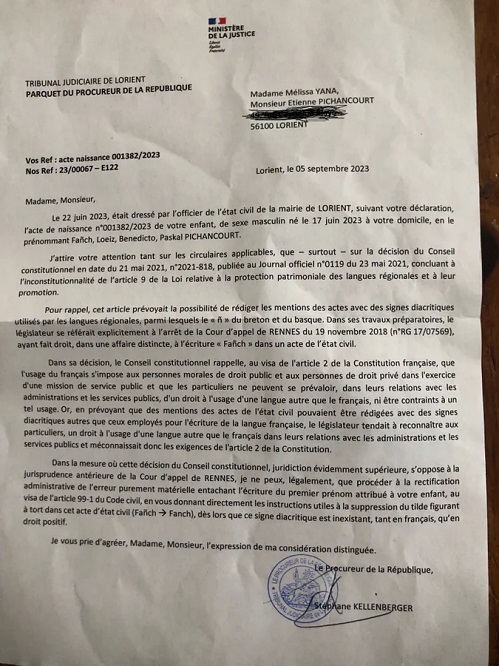French Government face legal action after banning parents from giving their child a Breton name

Luke James
The French Government is set to be taken to court for the second time in five years for banning parents from giving their children a Breton name.
Mélissa Yana and Étienne Pichancourt have been told they can’t name their newborn son Fañch, the equivalent of Francis or Ffransis which is associated with prominent Breton writers and language advocates.
The decision by France’s public prosecutor comes despite the country’s highest civil court upholding the right of another Breton family to give their child the same name in 2019.
Yana and Pichancourt were initially refused permission to use the name, which includes an accent which does not exist in French, when they went to register the birth.
The mayor of Lorient, where Fañch was born on June 17, then intervened to approve the name and the couple received official identity documents with their son’s correct name.
But they have now received a letter from France’s public prosecutor which says he “cannot legally do anything other than proceed with the administrative correction of the error in the writing of your child’s first name.”

“We’re stunned,” said father Étienne, who already has two daughters who attend Breton-language Diwan schools.
“We want our children to be immersed in Breton culture as well as French culture,” he told Ouest France. “And we wanted to be able to use the name of our choice.”
Stipulation
The letter cites the constitution’s stipulation that only the French language can be used in administrative matters, which prohibits the use of accents other than those used in the French alphabet.
The decision has caused outrage in Brittany since being published online earlier this week.
Mayor of Lorient Fabrice Loher hit back at the suggestion the name had been approved due to an administrative error, saying: “It was deliberate not an error. I don’t have the impression of putting the unity of the republic at risk. I think that is has other battles to fight.”
Loïg Chesnais-Girard, the President of Brittany, said: “Fañch doesn’t put the unity of the country at risk. On the contrary, accepting it is recognising our diversity and strengthening us collectively.
Lorient councillor Gael Briand pointed out that the name of the current head of the Paris police, Laurent Nuñez, used the same accent.
Paul Molac, who represents Lorient in the French national assembly, said: “In France, parents have the freedom to choose the name of their child…as long as it doesn’t include an accent from a regional language. What an absurdity.”
“The one solution to this problem? Change the constitution. Simple as that.”
France’s national assembly passed a law on regional languages in 2021, which included the right to use accents like the ‘tildé’ in the name Fañch.
But that part of the legislation was later struck down by the constitutional court, along with provisions for immersive education in France’s minority languages.
Support
The parents of Fañch say they are prepared to go to court and are already preparing their case with the support of local language activists and politicians.
They will be hopeful of victory after a similar case was resolved in favour of the parents of another Fañch.
In May 2017, Jean-Christophe et Lydia Bernard were refused permission to register their son’s name.
A court in Quimper/Kemper, where the couple live, said authorising the use of the accent would be tantamount to “breaking the will of the state to maintain the unity of the country and equality without distinction of origin.”
That judgement was overturned in 2018, a decision that was finally upheld by France’s supreme court in October 2019 – more than two and a half years after the child’s birth.
The ‘tildé’ hasn’t been the only subject of orthographic authoritarianism in France.
Breton also previously contained a crossed letter K (Ꝃ), which represented the sound “Ker”, which, in old Breton as in Welsh means Caer, as was used in both the names of places and people.
The French government banned use of the crossed letter K in both 1985 and 1955.
Read more: Students in Brittany win right to sit science exams in Breton language
Support our Nation today
For the price of a cup of coffee a month you can help us create an independent, not-for-profit, national news service for the people of Wales, by the people of Wales.






“breaking the will of the state to maintain the unity of the country and equality without distinction of origin.”
A truly frightening ambition. That’s the kind of state I’d queue up to topple.
Homogenising nonsense from a former imperial power 😠😡 I don’t recall Bretons giving up the right to their language or culture! The French state should outlaw this homogenising rubbish sooner rather than later!
In all matters relating to dictatorial oppression, we should remember the title of Labi Siffres’ ‘(Something Inside) So Strong’ and another line in it which says ‘We’re gonna do it anyway’. These lines are repeated numerous times throughout the song and throughout life should be repeated ad infinitum as should ‘If you tolerate this, your children will be next’. (Manics).
Our nearest equivalent to this is the bastardisation of our place names, all of which have meaning until changed by the ignorant and corrupted to mean nothing. Too numerous to list but so numerous, you see them everywhere, everyday.
Caerwrangan is never pronounced correctly.
Llan ” twit” always make me laugh.🤣🤣🤣 yet we put up with it.
I can imagine and Caerwys is routinely pronounced Care-weez. I despair!
Is Llanymynech pronounced differently on the English side compared to the Welsh side. If there is a difference which one is right?
All that discrimination for a little tilde…
Paris is scared of the Bretons. Some lessons for us, possibly?
Perhaps the Bretons should take the French Government to the European Court of Human Rights because surely this qualifies as a human rights violation? This worrying is the same convention that Tories want us to withdraw from.
Is this Europe in 2023 or France at the time of the Bastille and the of Terror of the Ist Republic ?
The French routinely break EU law when it comes to the Breton language, with this outdated attitude. They need to get over themselves and accept that French is not the only native language of the country. Take ’em to the European Court of Human Rights!
Indeed French isn’t the only native language of France. When Napoleon Bonaparte crowned himself emperor I think that only about a quarter of the population habitually spoke French, and Bonaparte himself was Corsican.